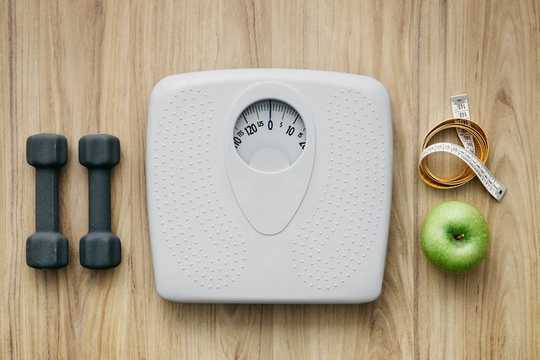 kudla/ Shutterstock
kudla/ Shutterstock
For most women, perimenopause – the transition to menopause – begins in their 40s. The entire menopause process typically lasts around four years and begins with the ovaries making less estrogen.
A woman is considered to be post-menopausal when she hasn’t experienced a menstrual period for 12 months. This usually occurs between the ages of 46 to 52 years.
Symptoms of menopause can include irregular periods, hot flushes, fatigue, tender breasts, night sweats, vaginal dryness, difficulty sleeping, changes in mood and lower libido.
During menopause, hormonal changes can affect the way fat is distributed in the body, but ageing is more likely to be the cause of any weight gain associated with menopause.
Get The Latest By Email
Gaining weight isn’t inevitable, though. There’s plenty you can do to combat weight gain as you age.
 Ageing is more likely to be the cause of any weight gain associated with menopause. Monkey Business Images/ Shutterstock
Ageing is more likely to be the cause of any weight gain associated with menopause. Monkey Business Images/ Shutterstock
Hormonal changes alter where the body deposits fat
Certain areas such as your stomach are more prone to weight gain during menopause. This is because the change in hormones, which lead to a higher testosterone-to-estrogen ratio, alters where the body deposits fat. Fat comes off the hips and is deposited around the middle.
But the hormonal changes involved in menopause aren’t the reason you gain weight.
 A higher testosterone-to-estrogen ratio resulting from menopause can restribute weight from the hips to the middle. Maridav/ Shuttertock
A higher testosterone-to-estrogen ratio resulting from menopause can restribute weight from the hips to the middle. Maridav/ Shuttertock
Ageing is the real cause
The weight gain that comes with menopause is a by-product of ageing.
As we age, our body stops working as efficiently as it did before. Muscle mass starts to decrease – a process known as “sarcopenia” – and fat begins to increase.
And because muscle mass is one of the determining factors of how fast your metabolism will run, when your muscle mass decreases, your body starts to burn fewer calories at rest. This might make it more challenging to maintain your weight.
As we age, we tend to continue with our same food habits but don’t increase our activity. In fact, aches and pains can make some people actively decrease theirs.
Not compensating for the ageing process and the change in body composition can lead to weight gain.
And this applies to men too – they are just as likely to gain weight due to this process known as sarcopenia.
Menopause and weight gain take their toll
Due to a change in body fat distribution and increase in waist circumference, menopause can also increase your risk of other health conditions.
Following menopause, your ovaries make very little of the hormones estrogen and progesterone. Estrogen helps to keep your blood vessels dilated – relaxed and open – which helps keep your cholesterol levels down.
Without estrogen, or with lower quantities, your bad cholesterol (known as low-density lipoprotein or LDL-cholesterol) starts to build up in your arteries. This can increase your risk of heart disease and stroke.
Having less estrogen also results in a loss of bone mass, putting you at risk of the disease osteoporosis, which makes your bones more prone to fractures.
What can you do?
Weight gain associated with ageing is not inevitable. There are a number of things you can do to maintain your weight as you age.
1. Exercise
Incorporate regular daily exercise, with a mixture of intensities and variety of activities. Try to include body-strengthening exercises two days per week.
2. Weigh yourself – but not too much
Weigh yourself once a week at the same time and day to monitor the trend over time. Any more than this will only create a fixation with weight. Day-to-day fluctuations in weight are to be expected.
 Regularly weighing yourself can help you monitor your weight over time. Stock-Asso/ Shutterstock
Regularly weighing yourself can help you monitor your weight over time. Stock-Asso/ Shutterstock
3. Create positive habits
Create positive habits by replacing negative behaviours. For example, instead of mindlessly scrolling through social media of an evening or turning on the TV and comfort-eating, replace it with a positive behaviour, such as learning a new hobby, reading a book or going for a walk.
4. Eat more slowly
Eat food away from technological distractions and slow down your food consumption.
Try using a teaspoon or chopsticks and chew your food thoroughly as slowing down your food consumption reduces the quantity consumed.
5. Switch off from technology:
Turn off technology after dusk to improve your sleep. Blue light emission from phones, tablets and other devices tell your brain it’s day, instead of night, which will keep you awake.
Lack of sleep (less than six hours per night) can compromise your decision-making abilities which might lead you to make unhealthy choices that contribute to weight gain.
6. Curb sugar cravings naturally
If you’re craving sugar you’re better off reaching for foods naturally high in sugar and fat first. Some great options are fruits, nuts, avocado and 100% nut butters. These foods release the same feel-good chemicals in the brain as processed and fast food and leave us feeling full.
Allow yourself your favourite treats, but keep them to once per week.![]()
About The Author
Nicholas Fuller, Charles Perkins Centre Research Program Leader, University of Sydney
This article is republished from The Conversation under a Creative Commons license. Read the original article.
books_health







